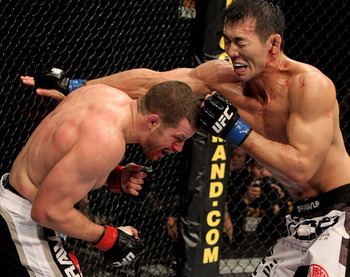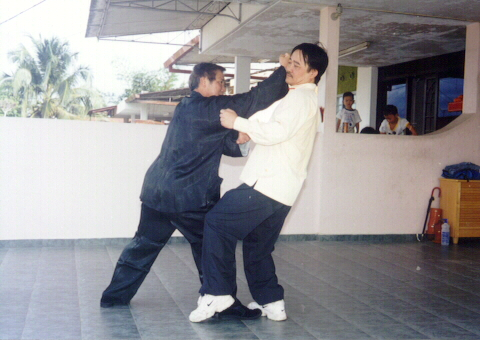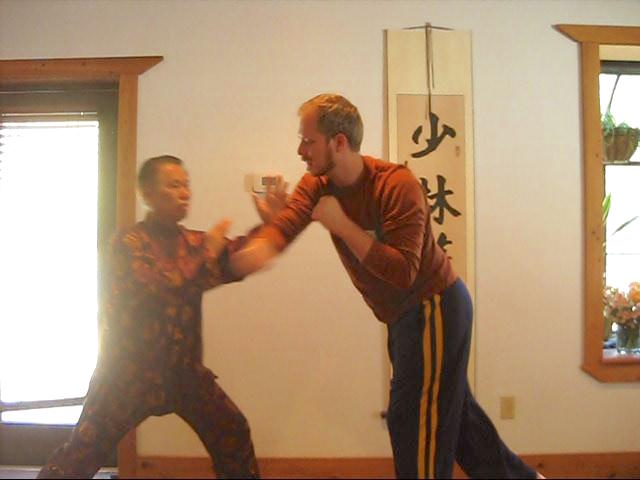ACQUIRING SKILLS AND TECHNIQUES AGAINST MMA FIGHTERS AND OTHER MARTIAL ARTISTS

MMA athletes can be very formidable fighters
Question
If a student shows interest in competing in MMA events, how much should their instructor encourage them? What benefits would there be from training for such a competition? What negatives would there be?
-- Sifu Matt Fenton
Answer
The instructor should give the student full encouragement and help.
An important aim of our school is to restore the glory of kungfu. An important manifestation of this aim is to take part in free sparring competitions using kungfu skills and techniques, and win. We claim that our kungfu is capable of combat, and we must walk our talk.
But we are not going to let our students enter competitions blindly and be bashed. As scholar-warriors, we do not enter combat and then hope to win. We already have won, and enter combat to confirm victory.
We do so not out of vain-glory, but paradoxically out of humbleness. When we win we must not humiliate our opponents, as unfortunately some MMA artists do. We must give respect to our opponents due to them. This does not mean we may not hurt our opponents. If it is absolutely necessary, we will not hesitate to disable or even kill an opponent. Fortunately, unlike in real fights, it is not necessary in competitions.
There are many benefits derived from both the training and the actual participation of MMA and other free sparring competitions. There are, of course, also negatives. But as scholar-warriors, we shall make the negatives as opportunities for improvement.
An obvious benefit is to restore the glory of kungfu. We are true to our belief that our kungfu is combat effective, and are ready to prove it. We do not want to be made a mockery of our philosophy.
We also have no illusion that MMA artists and other free sparring competitors are formidable. Except for experienced fighters in our school, many of our students will be badly beaten if they enter free sparring competitions now. This is not because our kungfu is inadequate, but because they lack real fighting skills and experience, which are different from friendly sparring amongst schoolmates.

Grandmaster Wong applies a Choy-Li-Fatt technique against Sifu Goh Kok Hin
Thus, if our students enter sparring competitions now, not only they will be defeated but more significantly they will be injured, physically as well as emotionally. They will lose confidence in themselves as well as in our school, and have doubts as to what we claim is true.
But we shall change these negatives to opportunities for improvement. We shall train them systematically so that they will progress from a position of being defeated and injured to a position where they can win free sparring competitions honourably and without sustaining injuries themselves. Besides seeing this transformation and gaining a lot of confidence, they will also gain much in tactics and strategies, as well as developing internal force and mental clarity, which are not only useful in free sparring competitions but more important in their daily lives.
The Choy-Li-Fatt course and the Kungfu against Other Martial Arts course at the Winter Camp in January 2012 are excellent for this purpose. If all other things were equal, Choy-Li-Fatt is the most effective for free sparring competitions, with or without gloves.
The Kungfu against Other Martial Arts course provides the most effective fighting skills for handling other martial artists. It represents the crystallization of my more than 20 years of sparring and actual fighting experience.
Earlier I mentioned that our students should win free sparring competitions without sustaining injuries. Many people, including our students, may be very surprised at this statement. It is because they equate free sparring to generous exchanges of blows and kicks where injuries are inevitable. This is random hurting one another, not genuine self-defence. In genuine self-defence, we do not want to be hit, not even once. Such skills will be systematically taught at the Kungfu against Other Martial Arts course.
Even after taking these two courses at the Winter Camp, students should not enter free sparring competitions yet. They should apply their fighting skills in a 30-Opponent programme. This is a close-door secret in our school that students have to learn personally from their sifus.
After completing the 30-Opponent programme, students should still not enter MMA competitions yet. MMA competitions represent high-level fighting. Students should start modestly, taking part first in local, regional and national competitions to gain experience and confidence before entering MMA and international competitions. Even in relatively low-level competitions, we must be sure of winning before we enter the competitions. A scholar-warrior does not enter combat and hopes to win, he has already won and enter combat to confirm victory.
-- Grandmaster Wong Kiew Kit

Applying appropriate skills to cover a Boxer's attacks
The above discussion is reproduced from the thread 20 Questions for Grandmaster: Choy-Li-Fatt and Kungfu against Other Styles in the Shaolin Wahnam Discussion Forum.

LINKS
